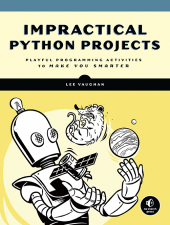Introduction
Chapter 1: Silly Name Generator
Chapter 2: Finding Palingram Spells
Chapter 3: Solving Anagrams
Chapter 4: Decoding American Civil War Ciphers
Chapter 5: Encoding English Civil War Ciphers
Chapter 6: Writing in Invisible Ink
Chapter 7: Breeding Giant Rats with Genetic Algorithms
Chapter 8: Counting Syllables for Haiku Poetry
Chapter 9: Writing Haiku with Markov Chain Analysis
Chapter 10: Are We Alone? Exploring the Fermi Paradox
Chapter 11: The Monty Hall Problem
Chapter 12: Securing your Nest Egg
Chapter 13: Simulating an Alien Volcano
Chapter 14: Mapping Mars with the Mars Orbiter
Chapter 15: Improving Your Astrophotography with Planet Stacking
Chapter 16: Finding Frauds with Benford's Law
Appendix: Practice Project Solutions
View the detailed Table of Contents
View the Index

